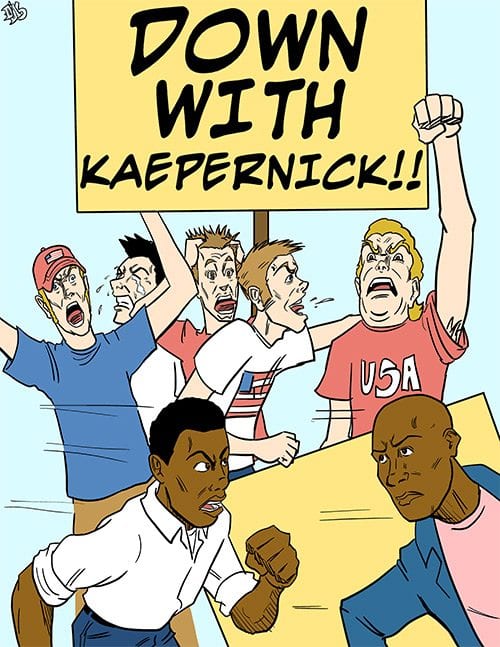
Prejudiced white men expect African Americans to be inordinately submissive. That is why when black families have “the talk” with their sons, to educate them about how to behave when confronted by the police, parents instruct them to be extremely polite. Anything short of obsequious behavior might be considered to be aggressive. San Francisco 49ers quarterback Colin Kaepernick violated that principle when he refused to stand for the national anthem before a football game. His quiet protest has unleashed a hostile tirade across the country, but the media and public opinion have until now essentially ignored Trump’s un-Americanism.
Some critics of Kaepernick condemn his protest as seditious, but how could that be when Donald Trump, the Republican candidate for U.S. president, has made public comments during the campaign that are at the very least subversive? Criticism of Trump has been relatively mild when compared with the outcry against Kaepernick, who did no more than kneel during the national anthem in constitutionally protected protest.
Trump’s first un-American remark came in July 2015, one month after he announced his candidacy. He said of Sen. John McCain of Arizona, a former prisoner of war, “he’s not a war hero. He’s a war hero because he was captured. I like people that weren’t captured.” McCain chose to stay in prison with his men rather than accept an early release. With five draft deferments, Trump avoided military service all together.
Many political savants expected that Trump’s insulting remark about McCain would mark the end of his political life, but his support began to grow and by December he was able, without adverse reaction, to demonstrate affinity for one of America’s prospective adversaries, Vladimir Putin, president of Russia. He responded to critical comments from the press about his relationship: “When people call you brilliant, it’s always good, especially when the person heads up Russia.”
By July, Trump seemed to back Russia’s annexation of Ukraine’s Crimea. When it was reported that Russian hackers had gained access to the Democratic Party’s digital files, Trump said, “Russia, if you’re listening, I hope you’re able to find the 30,000 emails [from Hillary Clinton] that are missing.” He essentially was supporting the invasion of a U.S. Secretary of State’s email files.
Not only has Trump shown an inclination for an inappropriate relationship with an American adversary, he also has challenged the usefulness of NATO, the primary agreement of military support for European Allies. He said on July 20, “If we cannot be properly reimbursed for the tremendous cost of our military protecting other countries … then yes, I would be absolutely prepared to tell those countries, ‘Congratulations, you will be defending yourself.’” Understandably, such talk has caused considerable insecurity in the capitals of some European allies.
Contrary to Trump’s assertion to the contrary, America already is great. There is no dispute that America is now the greatest economic power in the world and that U.S. political leaders must accept responsibility for managing affairs from that position of prominence. For that reason there is an unwritten rule that candidates for the U.S. presidency must show great respect for the office of president and exercise great discretion exhorting foreign affairs issues.
Trump has breached this protocol. He has shown considerable disrespect for his nation’s president. Last month he said of Barack Obama, “He’s the founder of ISIS. He’s the founder of ISIS. He’s the founder. He founded ISIS…” Trump made it clear that his assertion was not allegorical. He also has created considerable unrest among America’s allies. Yet, many Americans who tolerate Trump’s behavior are critical of Kaepernick’s quiet protest of the abuse of African Americans that is permitted in America.
The disparity in the public’s reaction to Trump’s divisive campaign for president and Kaepernick’s protest for equal justice indicates the depth of America’s race problem. The nation must understand that “justice delayed is justice denied.” The younger generation cannot be expected to be so patient when confronting bigotry.






